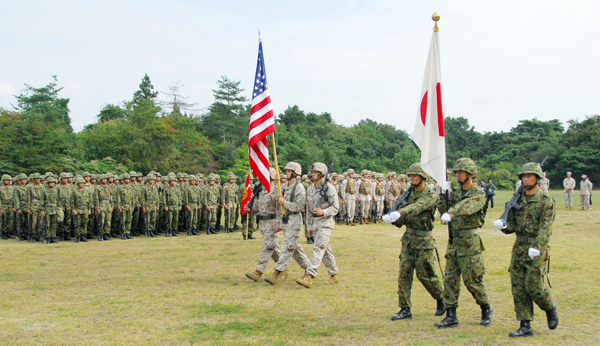Japan-US military drill raises tension
|
 |
|
A ceremony is held to mark the start of a joint exercise between the US Marine Corps and the Japan Ground Self-Defense Force at the Aibano training area in Takashima, Shiga prefecture, on Tuesday. Provided to China Daily |
As a scheduled annual event since 1981, joint drills between Japan's Self-Defense Forces and US Marines are slated to be the center of attention in October, at least in the East Asia region.
Tokyo is embroiled in tensions with its neighbors over territory and history, while the Abe administration has been beefing up Japan's own military and the Japan-US alliance.
This year, for the first time, the US MV-22 Osprey — a tiltrotor aircraft with a checkered safety record — will be involved in the joint exercises, which began on Monday and run through Oct 18.
Against a simulated war scenario, the drill will take place at the ground forces' Aibano training ground in Shiga prefecture. The two militaries postponed the drill due to powerful typhoons, Japan's Kyodo News reported. As planned, MV-22s will still fly from the US Marine Corp's Futenma air base to join the drill on Oct 16.
Additional training will be carried out in Kochi prefecture on Oct 25, with troops from both sides joining to deal with a simulated massive earthquake in the Nankai trough, according to the Japanese military. MV-22s will be used to conduct searches for victims and transport patients.
Wu Huaizhong, a researcher of Japanese foreign and defense policies at the Chinese Academy of Social Sciences, said the US-Japan defense alliance is basing their so-called security on undermining the security of other stakeholders in the region.
The measures that have been taken by the two traditional allies are "actually giving rise to regional tension", Wu warned.
"Tokyo is hyping the so-called military threat from China and the Korean Peninsula to justify its rising defense expenditure and military buildup," Wu said.
At a news conference on Sept 24, Japan's Defense Ministry press secretary Masayoshi Tatsumi said it would be useful for both Japan and the US to use MV-22s to enhance joint operation capability with the US Marines in tactical aspects.
Tokyo and Washington plan to hold the drills outside Okinawa, where 23 Osprey aircrafts are stationed at Futenma. The aircraft have further inflamed public opposition to the massive US military presence in Japan's southwest island prefecture.
Japan's Defense Ministry plans to introduce the Osprey to its SDF in 2015 at the earliest.
Typhoon Danas has delayed a joint US-Japan-Republic of Korea naval exercise — involving the nuclear-powered USS George Washington aircraft carrier as well as Japanese and ROK naval ships, the Wall Street Journal's Korea Real Time quoted military officials in Seoul as saying.
The drill had been scheduled to take place from Tuesday to Thursday in waters off the Korean Peninsula. The Democratic People's Republic of Korea warned the US of a "horrible disaster" over the drill.
Observers warned the military exercises would cause tensions in the region to spike.
The US-Japan Security Consultative Committee convened a "two-plus-two meeting" in Tokyo on Thursday, with Japanese Foreign Minister Fumio Kishida, Japanese Defense Minister Itsunori Onodera, US Secretary of State John Kerry and US Defense Secretary Chuck Hagel producing a joint statement.
The document announced the two countries would revise their defense cooperation guidelines by the end of 2014 to respond to the increasingly severe situation in the Asia-Pacific region.
The US and Japan agreed to increase training outside of Okinawa, including on mainland Japan, so as to maintain the deterrence capabilities of their alliance. "Bilateral and multilateral exercises, both hosted by Japan and in areas outside Japan, have improved interoperability and sharpened our ability to deter aggression, defend Japan and maintain regional peace and security," the statement said.
The two countries agreed to deploy a second early-warning radar in Kyoto prefecture, Japan, next year to help protect Japan against threats from the DPRK. There is already one X-band radar system in north Japan.
Li Jie, a senior expert at the Naval Military Studies Research Institute of the People's Liberation Army, said Washington and Tokyo have taken years "boosting encirclement to contain China's military presence" after Washington announced its strategy to pivot to Asia-Pacific.
The traditional allies are "attempting to block the maritime routes" that allow Chinese naval vessels and civilian ships to sail into the Pacific Ocean, Li said.
Also for the first time, the allies will deploy new long-range surveillance drones in 2014 to help monitor China's Diaoyu Islands, and two or three will fly from a US base.
The US Navy's P-8 anti-submarine aircraft will also be dispatched to Japan later this year — their first deployment outside the US.
Japan's defense chief visited Iwo Jima on Sunday and declared Japan would build a communication monitoring base there as soon as possible to expand its surveillance activities to cover the Pacific Ocean off its east coast. Japan will begin the designing work in 2014 and put the facility into operation within three years.
The facility will intercept wireless communication around the island, located east of Okinawa and 1,250 km south of Tokyo.



























